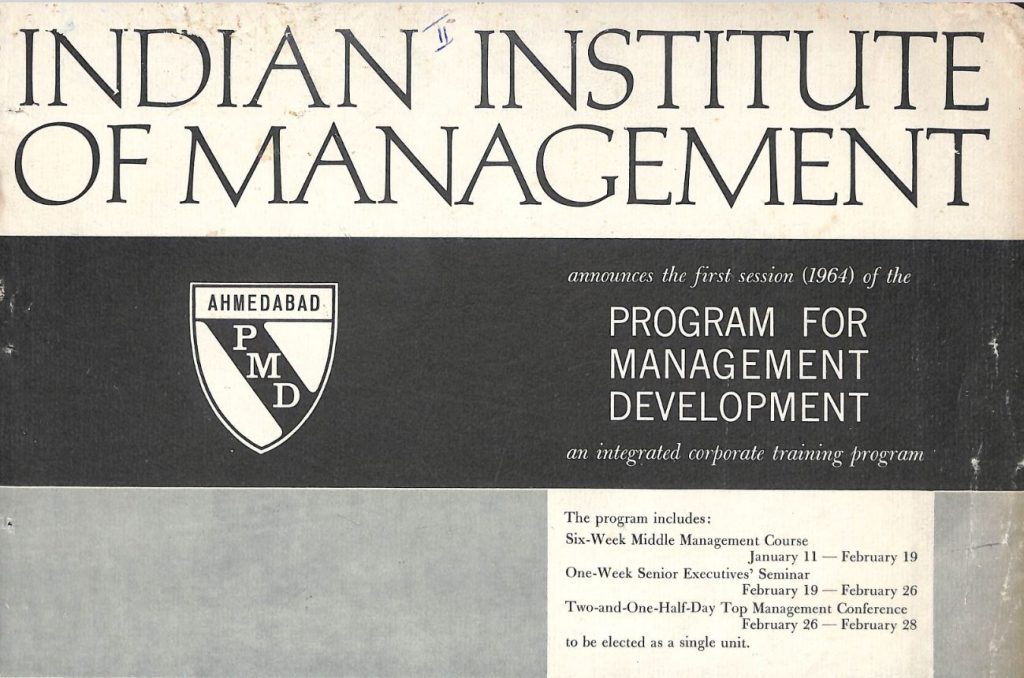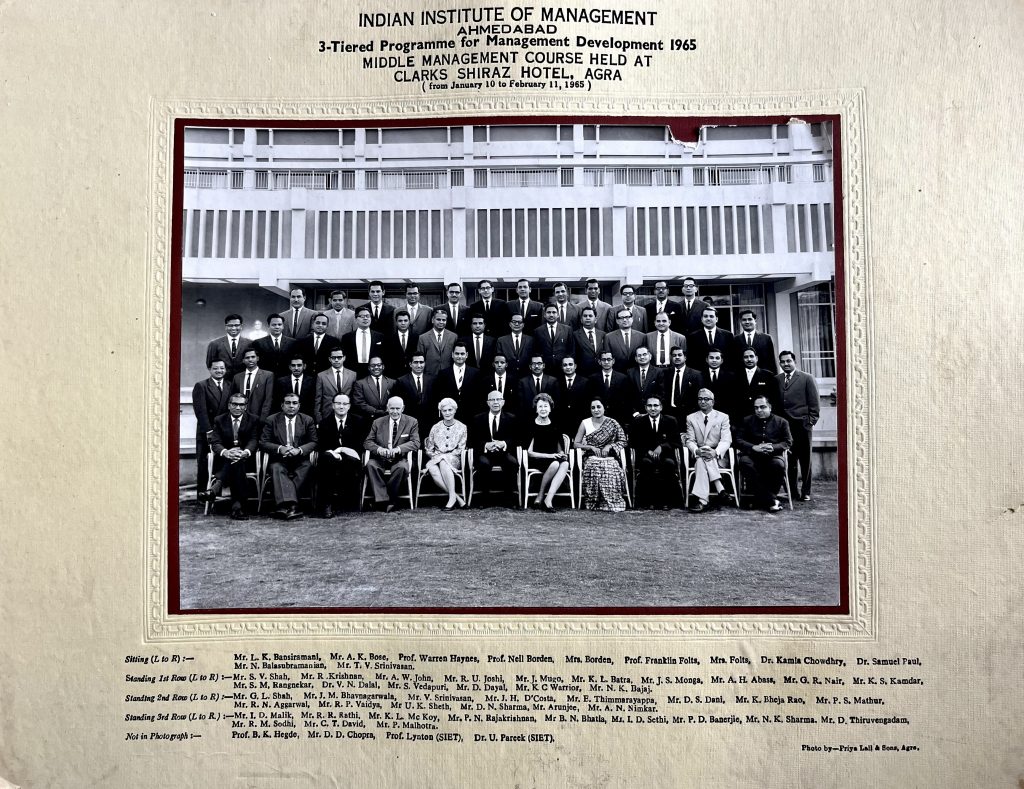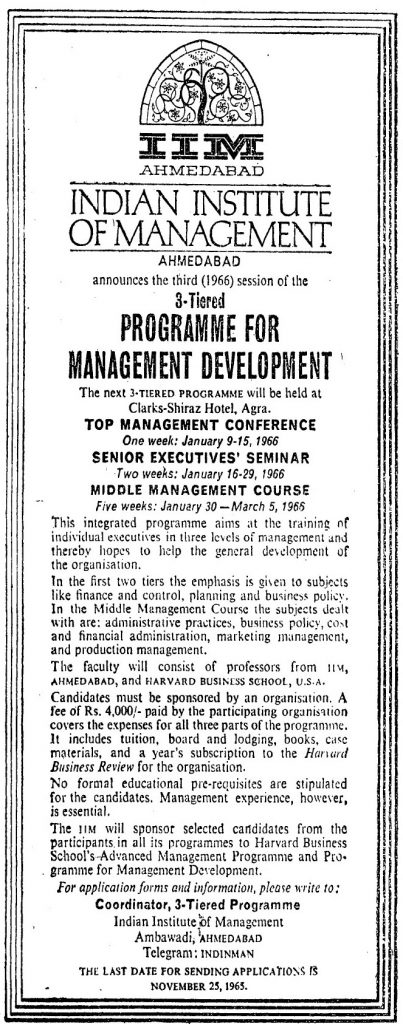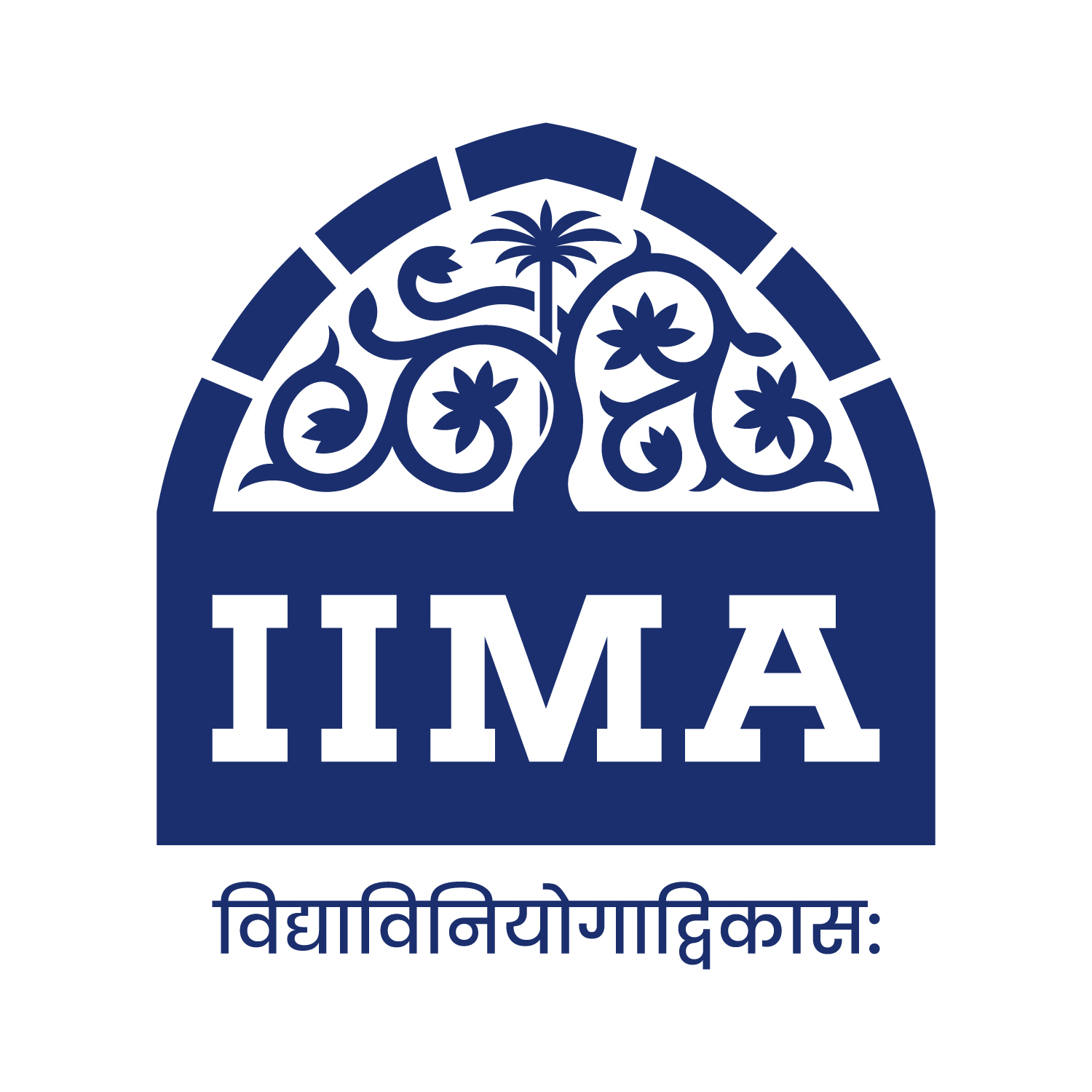IIMA’s Tryst with Innovation: 3TP and Management Development Experiments
IIMA Archives
Imagine the second decade after India gained independence, when the field of management education was just beginning to take shape in the country. During this time, our institute recognized the growing need for management skills and launched its first session of the innovative Three-Tiered
Programme (3TP) in January 1964. The three tiers represented corporate executives drawn from three different levels of the corporate hierarchy–middle-level managers, senior executives, and top management personnel. Interestingly, this programme was introduced even before the Post Graduate Programme (PGP) that was launched later that year. In this article, we will explore the background, objectives, and history of the management development experiments conducted through the initial sessions of the 3TP programmes, which took place between 1964 and 1967 in Jaipur and Agra.
The brochure announcing the first session of the Programme for Management Development (PMD) in 1964 emphasized the integrated nature of this corporate training program. The modules were designed to be as a cohesive unit, and we have included a photograph of the brochure for reference.

The aforementioned brochure also highlighted the tuition fee for the programme of Rs. 3,000, to be paid by the participating organization. Professor Kamla Chowdhry, the first faculty member at IIMA, served as the Coordinator of the Programmes, along with faculty from the business school at Harvard, IIMA’s institutional partner in its initial years: Professors Neil H. Borden, Franklin E. Folts, Harry L. Hansen, and Warren Haynes. According to Mr. Prafull Anubhai, the author of The IIMA Story: The DNA of an Institution, the credit for the ideation of the 3TP went largely to Dr. Kamla Chowdhry.
The brochure emphasized the “need” of the programme and highlighted the “objectives” of the institute, which were very clearly defined. The brochure stated, “training for management extends beyond the frontiers of formal education in humanities, scientific, and engineering disciplines is of quite recent awareness in India. It is understandably the obvious first priority in development to think of means of production; and the next of the men with the requisite skills, the engineers, the chemists, and accountants. But for the operation to work at more than its optimum efficiency, these men need the wider appreciation of the overall purpose and wholeness of the operation and the attitudes and philosophy that take the organization forward. This is the objective of the Indian Institute of Management at Ahmedabad. The Institute hopes to achieve this objective through its basic function, a two-year postgraduate course, surrounded by management development programs (now programmes) for top, senior, and middle level executives, and specialists functional courses, all supported by field research on the problems and needs of Indian management. The postgraduate school is expected to start its first term in July 1964.”
The Institute’s second Annual Report (1963-64) highlighted the successful execution of the three-tiered MDP Programme, designed for middle-level managers, senior executives, and top management personnel from various organizations in India. This programme took place from January 11 to February 28, 1964, at Rambagh Palace Hotel in Jaipur. A total of 40 companies (See Table 1 below), both from the public and private sectors, participated in the programme, with a total of 120 representatives.
The report emphasized that the programme aimed to broaden the executives’ perspectives and provide them with training and leadership opportunities. The Middle Management Course focused on management and decision-making in key business areas such as cost and financial control, marketing, and production. Additionally, the course addressed the human problems of organization and the challenges of coordinating work across different functional fields. The seminar for senior executives placed emphasis on operational policymaking and the integration of corporate activities. This seminar targeted experienced individuals who had demonstrated exceptional promise through at least 10 years of complex professional endeavors.
The Top Management Conference catered to Managing Directors and individuals responsible for major divisions such as finance, marketing, or production. Its primary focus was on long-range planning, corporate development, and the establishment and achievement of goals.
During the meeting of the IIMA society on September 4, 1964, held at 310 Camp Road, it was discussed and decided that future Top Management Conferences should be allotted more time. This decision was made in response to feedback that the Jaipur session had been too short (see the brochure above).
The second session of the 3TP Programme for Management Development took place in Agra from January 10, 1965, to February 26, 1965 at the Clarks Shiraz Hotel in Agra (See Figure 2). The tuition fee for the programme was Rs. 3,500, and it received an excellent response. The number of participating organizations increased from 40 to 44, with a mix of public (10) and private (34) sectors. Additionally, two extra participants were sponsored by the Kenyan Government (See Table 2 below).

The Institute’s third Annual Report (1964-65) highlighted the following points: “Appraisal of the Programme was solicited, and written comments received from the participants indicated that the Programme had achieved its objectives. The motivation of the participants was high, and the development of new insights was quite perceptible in many cases. The major criticism of the Programme was with regard to the short duration of the third tier, viz: for top management. On the basis of the experience with the Programme in 1964, several changes were made in the plans for 1965. The length of stay for senior executives was increased from 5 to 10 days. The top executives would attend for 5 days instead of 2½ days; but the broad outlines of the Programme were maintained. Asoka Mehta, Deputy Chairman of the Planning Commission, Mr. Harold Hartog, Director of Unilever Limited, Mr. S. S. Khera, Dr. Ensminger of the Ford Foundation, Dr. Basu and other distinguished persons visited Agra during the course of the Programme and had expressed appreciation. The feedback from the participants had also been very good. The Faculty for the Programme consisted of Prof. Kamla Chowdhry, Prof. Harry L. Hansen, Prof. Neil H. Borden, Prof. Franklin Folts, Prof. Warren Haynes, Prof. B. K. Hegde, Prof. S. Paul, Mr. Rolf P. Lynton of SEIT Institute and Mr. Udai Pareek, Deputy Director, Small Industry Extension Training Institute, Hyderabad.”
After the successful completion of the second 3TP session, the institute published an advertisement in leading newspapers for the upcoming third session. This session was planned to take place at the Clarks- Shiraz hotel in Agra from January 9 to March 5, 1966. The fee for this session was Rs. 4,000, which covered all the related expenses.

IIMA Ad for Management Development Programme, The Times of India, Oct 30, 1965, p. 7 Source: ProQuest Times of India Archives (from 1838-2010) database at Vikram Sarabhai Library, IIMA
The brochure for the third session included two additional paragraphs highlighting the “need” of the programme. These paragraphs are crucial in understanding the progress of IIMA in the years following its establishment. We have reproduced them here: “The industrialisation and economic growth of India will depend, more than on any other single factor, on the quality of those men and women who are managers; be it in a manufacturing organization, financial institution or a Government organization. How well they understand, plan and execute will determine the rate of our growth.”
Additionally, “Modern, industrial managers, all over the world, have much in common because industrial developments and techniques themselves are becoming uniform. But as successful industrial processes cannot be borrowed without taking into account local conditions, so management philosophies and techniques need to be understood in the context of India’s social and economic culture and needs. The Institute hopes to achieve this objective through its basic function. A two-year postgraduate course surrounded by Management Development programmes for top, senior and middle level executives and specialist courses on functional areas—all supported by field research on the problems and needs of Indian Management.”
The third session of the 3TP Programme for Management Development received a positive response, as the number of participating organsations increased to 50. These organizations represented a mix of public (11) and private (39) sectors, with a total of 155 executives in attendance.
 3TP Programme at Clarks Shiraz Hotel, Agra (most likely from the third session, 1966 or fourth session, 1967) Source: IIMA Archives
3TP Programme at Clarks Shiraz Hotel, Agra (most likely from the third session, 1966 or fourth session, 1967) Source: IIMA Archives
The fourth session of the 3-Tier Programme also took place at Hotel Clarks Shiraz in Agra from January 8 to March 4, 1967. The fee for the Programme was raised from Rs. 4,000 to Rs. 5,300 per organization. That year’s session was highly successful, as evidenced by the increased number of organizations and executives participating in the Programme. A total of 70 organizations (13 public and 57 private sector) with 218 executives took part in the Programme.
According to the Fifth Annual Report of 1966-67, notable individuals such as Dr. Douglas Ensminger of the Ford Foundation, Prof. M. G. Pimputkar of the National Academy of Administration, Shri K. R. Srivatsa of the Gujarat State Fertilizer Company Limited, and Shri P. L. Tandon of Hindustan Lever Limited visited Agra during the Programme. Dr. T. N. Kapoor, Head of the Department of Commerce and Business Administration at Punjab University, attended the Top Management Conference as an observer.
The esteemed faculty for the Programme included Prof. S. K. Bhattacharyya, Malathi Bolar, Kamla Chowdhry, John Dearden, Wilbur B. England, Franklin E. Folts, B. K. Hegde, V. L. Mote, and B. G. Shah. Prof. S. K. Bhattacharyya, Director (Programmes), served as the Programme’s Coordinator.
The interest and acceptance of these programmes grew exponentially, attracting numerous participant organizations, executives, and requests. Over the years, the Institute has continuously innovated and developed various programmes to cater to the management needs of India and the global market. As a result, both long-term and short-term programmes have gained immense popularity and are in high demand. The 3TP brand still exists though offered in a different form than in the 1960s.
IIMA’s Executive Education Programmes stand out as the most comprehensive management programmes in India, with a portfolio of ‘over 200 programmes’ (Source: https://web.iima.ac.in/exed/index.php). Additionally, the MDP programmes have become a prestigious platform for corporate executives in India.
Table 1: List of participating organizations: First session of 3TP Programme, 1964
| 1. | AIR-INDIA, 87, Mahatma Gandhi Road, Bombay—1. |
| 2. | Amul (Kaira District Co-operative Milk Producers’ Union Ltd., Anand, Gujarat State.) |
| 3. | The Arvind Mills Ltd., P. B. No. 56, Ahmedabad—2. |
| 4. | The Aryodaya Spg. & Wvg. Co. Ltd., Asarva Road, Ahmedabad—11. |
| 5. | The Associated Cement Cos. Ltd., Cement House, 121 Queen’s Road, Bombay—1. |
| 6. | The Bajaj Electrical Ltd., 45—47 Veer Nariman Road, Bombay—1. |
| 7. | The Bank of Baroda Ltd., Gandhi Road, Ahmedabad. |
| 8. | Batliboi & Co. Pvt. Ltd., Forbes Street, Bombay—1. |
| 9. | Carborandum Universal Ltd., 52/53 Jehangir Street, Madras—1. |
| 10. | The Delhi Cloth & General Mills Co. Ltd., Bara Hindu Rao, Delhi—6. |
| 11. | Dodsal Pvt. Ltd., Mafatlal House, Backbay Reclamation, Bombay—1. |
| 12. | The Gujarat Electricity Board, Race Course Road, Baroda. |
| 13. | The Gujarat Electricity Board, Race Course Road, Baroda. |
| 14. | The Industrial Credit & Investment Corporation of India Ltd., 163, Backbay Reclamation, Bombay—1. |
| 15. | Indian Aluminium Co. Ltd., 31, Chowringee Road, Calcutta—16. |
| 16. | Life Insurance Corporation of India, Central Office, Jeevan Kendra, J. Tata Road, P. B. No. 252, Bombay—1. |
| 17. | Mahindra & Mahindra Ltd., Gateway Building, Apollo Bunder, Bombay—1. |
| 18. | The Sree Meenakshi Mills, Post Box No. 1, Madurai. |
| 19. | Mukand Iron & Steel Works Ltd., Agra Road, Bombay—70. |
| 20. | National Seeds Corporation Ltd., E 19 South Extension Part II, New Delhi—16. |
| 21. | The New India Assurance Co. 87, Mahatma Gandhi Road, Bombay—1. |
| 22. | The Nutan Mills Ltd., Anil Road, Ahmedabad—2. |
| 23. | Otis Elevator Co. (India) Ltd., Gateway Building, Apollo Bunder, Bombay—1. |
| 24. | The Raipur Mfg. Co. Ltd., Outside Saraspur Gate., Post Box No. 54, Ahmedabad—10. |
| 25. | Sarabhai Chemicals, Post Box No. 28, Ahmedabad. |
| 26. | Saroja Mills Ltd., ‘Meenakshi Nilayam’, Tirupparankundram Road, Madurai. |
| 27. | Smith Kline & French (India) Ltd., Post Box No. 1953. Bombay—1. |
| 28. | State Bank of India., General Office, Post Box No. 12, Bombay—1. |
| 29. | Suhrid Geigy Ltd., Post Box No. 28, Ahmedabad. |
| 30. | Swastik Oil Mills Ltd., Post Box No. 28, Ahmedabad. |
| 31. | Tata Chemicals Ltd., Bombay House, Bombay—1. |
| 32. | The Tata Iron & Steel Co. Ltd. |
| 33. | Staff Training Institute, The Tata Iron & Steel Co. Ltd., Armoury Road, Jamshedpur. |
| 34. | Times of India Ltd., (Bennett Coleman & Co. Ltd.), Dr. Dadabhai Naoroji Road, Fort, Bombay—1. |
| 35. | T. V. Sundram Iyengar & Sons, Private Ltd., 211 South Veli Street, Madurai. |
| 36. | Union Carbide India, Ltd., 1 & 3 Brabourne Road, Post Box No. 2170, Calcutta—1. |
| 37. | The United Commercial Bank Ltd., 2 India Exchange Place, Post Box No. 2455, Catcutta—1. |
| 38. | Voltas Ltd., 19, Graham Road, Ballard Estate, Bombay—1. |
| 39. | Larsen & Toubro Ltd., IC House, Dougall Road, Ballard Estate, P. B. No. 278, Bombay—1. |
| 40. | Rajasthan State, Electricity Board, New Hotel Buildings, Jaipur. |
IIMA Second Annual Report, 1963-64, Pg. 29-33. Source: IIMA Archives
Table 2: List of participating organizations: Second session of 3TP Programme, 1965
| 1. | AIR-INDIA, 87, Mahatma Gandhi Road, Bombay—1. |
| 2. | Alembic Chemical Works Co. Ltd., Baroda |
| 3. | Amrit Banaspati Co. Ltd., Ghaziabad |
| 4. | Asbestos Cement Ltd., Bombay |
| 5. | Dr. Beck & Co. (I) Ltd., Poona |
| 6. | Eastern & North Eastern Railway |
| 7. | Esso Standard Eastern, Inc., Bombay |
| 8. | First National City Bank, Bombay |
| 9. | Gannon, Dunkerley & Co. Ltd., Bombay |
| 10. | Gujarat Steel Tubes Ltd., Ahmedabad |
| 11. | Hindustan Lever Ltd., Bombay |
| 12. | Hindustan Steel Ltd., Durgapur |
| 13. | Hindustan Steel Ltd., Ranchi. (Central Eng. & Design Bureau) |
| 14. | Indian Oil Corpn. Ltd., Bombay |
| 15. | Jenson & Nicholson (I) Ltd., Calcutta |
| 16. | Jyoti Ltd., Baroda |
| 17. | Kenya, Africa—Caltex Oil(Kenya) Ltd. |
| 18. | Kenya, Africa—M/s Mohamed Sheikh & Bros. |
| 19. | Larsen & Toubro Ltd., Bombay |
| 20. | National Dairy Research Institute, Karnal (Punjab) |
| 21. | National Small Industries Corpn. Ltd., New Delhi |
| 22. | Otis Elevator Co. (I) Ltd., Bombay |
| 23. | Pfizer Private Ltd., Bombay |
| 24. | P. S. G. Industrial Institute, Coimbatore |
| 25. | Radio & Electricals Mfg. Co. Ltd., Bangalore |
| 26. | Sarabhai Merck Ltd., Baroda |
| 27. | Singer Sewing Machine Co., Bombay |
| 28 | Smith Kline & French (I) Ltd. Bombay |
| 29. | State Bank of India, Bombay |
| 30. | Swastik Oil Mills Ltd., Bombay |
| 31. | Synbiotics/Standard Pharmaceuticals Baroda |
| 32. | The Ahmedabad Electricity Co. Ltd., Ahmedabad |
| 33. | The Aluminium Industries Ltd., Kerala |
| 34. | The Associated Cement Cos. Ltd., Bombay |
| 35. | The Bank of India Ltd., Bombay |
| 36. | The Delhi Cloth & General Mills Co. Ltd., Delhi |
| 37. | The Gujarat Electricity Board, Baroda |
| 38. | The Industrial Credit & Investment Corporation of India Ltd., Bombay |
| 39. | The Jaipur Udyog Ltd., Calcutta |
| 40. | The Paper Products Ltd., Bombay |
| 41. | Tata Iron & Steel Co. Ltd., Jamshedpur |
| 42. | T. I. Cycles of India, Madras |
| 43. | Union Carbide India Ltd., Calcutta |
| 44. | The United Commercial Bank Ltd., Calcutta |
| 45. | Voltas Ltd., Bombay |
| 46. | The West Coast Paper Mills Ltd., Dandeli |
Programme Brochure, IIMA 3-Tier Programme for Management Development, 1966, Pg. 15-18.
Source: IIMA Archives

